
2023
CAREER LEADERSHIP COLLECTIVE AWARD WINNERS
Recognizing outstanding initiatives in college and university career services.
We are excited to celebrate our winners of the 2023 Career Leadership Collective Career Innovation Awards AND our brand new Career Services Pursuit of Excellence awards!
2023 Career Innovation Awards
These awards celebrate unique and impactful career development initiatives that are related to at least one of the following: scaling career development or employer relations, using career data effectively, embedding career development into the campus ecosystem, DEI in career services, faculty engagement in deploying career development, and/or brand/marketing success.
Join us in congratulating our 2023 winners!
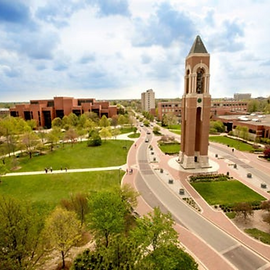
Ball State University
"Ball State University Career-Ready Ecosystem"
Submitted By:
Jim McAtee, AVP/Executive Director for Career and Professional Development

Arizona State University
"Work+: Transforming Student Employment into Authentic Working AND Learning Experiences"
Submitted By:
Brandee Popaden-Smith, Director, Work + Learn

Johns Hopkins University
"Charting New Horizons: A Free and Scalable Career Conference Championing Global Doctoral Communities through Diversity, Equity, and Inclusion"
Submitted By:
Roshni Rao, Executive Director, Doctoral and Postdoctoral Career Design

Pomona College
"The Smart Start Career Fellows Program"
Submitted By:
Hazel Raja, Associate Dean & Senior Director

Utah State University
"Career Tutorials for Students, Scaling Career Development"
Submitted By:
Jillian Morley, Assistant Director & Career Design Specialist
Career Services Pursuit of Excellence Award 2023
Our team is introducing the very first Career Services Pursuit of Excellence Award. This new and unique annual award is for campuses that embody a holistic and long-standing commitment and pursuit of excellence in career services.
These campuses exude a high commitment to growth and quality in the following five areas:
-
Career Services Strategic Planning
-
Career Staff Leadership Development
-
Career Outcomes Data Analysis and Visualization
-
Scaled and Equitable Career Services
-
Career Team Professional Development
We're excited to announce the inaugural 2023 Career Services Pursuit of Excellence Awards!

Smith College

University of Delaware

Centre College

Miami University
2023 Career Innovation Award Initiatives
Ball State University
"Ball State University Career-Ready Ecosystem"
Purpose
Students were practicing the competencies employers want through engaging with their academic content and co-curriculars and faculty were reinforcing them, but there was no common language to help articulate this work. Also, students were not realizing they were practicing these skills. Workplace competencies needed to be elevated to the same importance as academic content. Internal and external partners needed to know that students were getting both a rigorous academic experience while learning the skills employers seek, spanning from theater and arts through to accounting and architecture, all seven colleges participate at the direction of the Provost and lead by the Career Center, which are in different divisions at the university by the way. One program would not suffice, so over the last 10 years we built an ecosystem to ensure the competencies were embedded everywhere possible, including the university strategic plan. We want every student to graduate with the ability to articulate their academic coursework in concert with their workplace competencies.
Process:
A short paragraph just is not possible. There are too many parts. So, here is a case example of a student engaging with some parts of the ecosystem:
Sam is a first generation college student. Sam sees which competencies will be learned in their on-campus job. Sam's faculty was trained through the Skills Infusion Program. In class Sam sees course outcomes mapped to competencies on the syllabus and which skills they should practice with each assignment. Sam's faculty was placed in the Faculty Externship Program upon completion of the Skills Infusion Program where the faculty member saw where these skills show up in the workplace, and made some industry friends. One of Sams’ course assignments is to reflect on the Communication competency in the Learner Experience Record, a repository being built of iterative reflections about developing each competency, teaching them to articulate their skills. Sam’s student group requires Career-Ready, a set of 8 pathways, each engaging with one of the eight competencies. Sam writes about what she learned in class and how she used that with her student group. Sam visits the Indiana Connection Lounge where Sam practices articulating skills to visitors. Sam gets an internship with the Indiana Motor Speedway. Sam never thought of the IMS as a place to work, she just thought about racing. Now it is a place to grow professionally. Sam will be back in a few years to volunteer her time with the Practice Interview Program, Skills Infusion, or maybe host a faculty extern at her place of work. Sam will definitely be invited to the Career Center Night of Gratitude, an event with over 150 attendees celebrating every part of the ecosystem which helps students, faculty, alumni, and employers succeed.
The Learner Experience Record is in development and will be launching this fall. Everything else is happening right now and has been for years. This is an example of a real student experience. because of the ecosystem that has been built.
Results
-
Skills Infusion and Faculty Externships written into the strategic plan for the university
-
Nearly 30% of faculty are trained in Skills Infusion so far
-
Ecosystem is used as examples by our president during budget presentations at the statehouse
-
Generated new funding to launch the Indiana Connection Lounge and Experience
-
The Foundation fully funded a position to be placed in the career center to focus on growing the mentor program by using our ecosystem to engage students in mentoring
-
Even though we are housed in Student Affairs, it is hard to tell that we are not a part of Academic Affairs, Government Relations, or the Foundation. Our relationships are seamless
Relevant Links:
Arizona State University
"Work+: Transforming Student Employment into Authentic Working AND Learning Experiences"
Arizona State University (ASU) and our Work+ program are fundamentally redesigning student employment into a personalized experience that integrates working and learning. The program’s design is novel; we leverage thousands of existing student employment jobs – largely filled by students facing the most barriers to postsecondary and career success – and integrate career readiness support throughout the paid work experience. This enables students to simultaneously gain professional work experience, while also learning how to articulate their transferable skills and competencies to employers across the nonprofit, corporate and government sectors. Driven by the ASU charter, which mandates that ASU’s success is “measured not by whom it excludes, but by whom it includes and how they succeed,” Work+ is transforming student employment into an authentic learning experience by developing working learners’ career readiness competencies, coaching them to articulate their professional story, and training supervisors to serve as mentors. Equity is a core value at ASU and Work+ is intentionally designed to create more equitable outcomes for the students who face the most barriers to postsecondary and career success, including students of color, first-generation college students, and those with high financial need. Across the country, these historically marginalized students come from families with lower household incomes than their white and continuing-generation peers, necessitating that many of them work to pay for school, which can preclude their participation in career development opportunities like internships.
Having successfully piloted Work+ over the past two years, we are now dramatically increasing the program’s reach and impact by scaling to all 12,000+ students employed annually at ASU, and launching three tiers of collaborative engagement resulting in Work+’s expansion to 60+ two- and four-year institutions across the country over the next 3 years. We have launched the Work+ Institute in partnership with 8 national higher education institution partners. This user-centered design process is supporting partners as they discover, design and launch a strategy that meets the needs of their respective campus contexts as they seek to improve the student employment experience and ensure all working learners are building essential skills and competencies. Work+ addresses inequities in career readiness preparation and, later, employment outcomes, for this target population of historically marginalized students by redesigning existing student employment roles and creating avenues for students to earn necessary income, gain valuable real-world experience, build transferable skills connected to their professional goals, and leverage a support system of people dedicated to their success.
In addition to the Work+ National Scaling Institute, we are also launching a digital experience in Summer 2023 that will support any institution in designing and implementing an intentional process where they can explore the true current state of student employment at their campus, identify the prioritized areas of needed attention, and design a prototype or pilot experience to begin transforming their student employment experiences. To date, 2,000+ students and 200+ supervisors from across three universities have piloted and engaged in the Work+ program.
Relevant Links:
Johns Hopkins University
"Charting New Horizons: A Free and Scalable Career Conference Championing Global Doctoral Communities through Diversity, Equity, and Inclusion"
Launched in 2020 by the university-wide doctoral career hub PHutures, the Horizons by Hopkins doctoral career conference aims to empower participants by enabling them to explore bold and diverse career possibilities, nurture professional growth, and deliver practical strategies for wide-ranging career-building efforts. The conference offers a free, scalable, accessible, and inclusive virtual experience, designed to break down barriers to entry and redefine success both within and beyond the academy. Horizons focuses on three crucial areas: (1) prioritizing the distinct needs and experiences of the doctoral community, including doctoral students and postdoctoral researchers, (2) addressing enduring inequities in the academy by facilitating open discussions and implementing tangible strategies for change, and (3) capitalizing on the virtual environment (Whova App) to encourage intimate, connection-building networking opportunities among participants. This pioneering approach, centered on exploring bold themes, fosters dialogue, collaboration, and transformation in graduate education and career development.
The development of the Horizons by Hopkins conference is a joint endeavor, uniting PHutures staff and a diverse planning committee of doctoral students and postdoctoral researchers. Committee members receive stipends and are assigned roles tailored to their strengths, such as marketing, outreach, and logistics. Conference themes and topics are thoughtfully designed based on feedback from surveys conducted among students and postdocs, ensuring the content effectively addresses their needs. With diversity, equity, and inclusion (DEI) as its cornerstone, the conference features intentionally diverse speakers and embraces bold, visionary themes. Asynchronous elements, such as the "Beyond the Horizon" podcast series and YouTube videos, offer added value and accessibility. The conference actively engages the entire university ecosystem, striving for high-profile speakers to enhance visibility and involving multiple campus stakeholders to align interests and foster collaboration. Before the conference, Career Impact Awards are presented to the community, recognizing and encouraging their contributions to fostering a supportive career culture at the university. Marketing teams and colleagues across campus promote the conference's essential themes and topics, ensuring the programming remains innovative, responsive, and representative of the participants' experiences and needs.
The Horizons by Hopkins doctoral career conference has had a transformative impact on participants, faculty, and the overall campus ecosystem. By addressing the unique challenges and opportunities of the doctoral experience, the conference has fostered an inclusive and supportive environment that values diverse perspectives and career trajectories. The conference has solidified PHutures as the premier career office at Johns Hopkins University, dedicated to supporting doctoral students and postdoctoral fellows. Horizons by Hopkins has significantly expanded its program offerings to a global audience, growing from 700 participants from 20 countries in Fall 2020 to over 3,000 attendees from 43 countries in Fall 2022. Consistently, 80 – 90% of attendees in the past three years have rated the content as good or excellent and have indicated in the post-conference survey that the conference has met their expectations. Horizons by Hopkins has effectively integrated career conference priorities with vital themes in higher education, social justice, and antiracism. Highly regarded sessions featuring Dr. Ibram X. Kendi and Amber Hikes garnered impressive satisfaction rates of 94% and 92%, respectively. In 2022, funding increased by 525% compared to the first year, and the conference reached capacity virtually after announcing global sensation Trevor Noah as the keynote speaker. The additional funding facilitated expanded student stipends, equitable speaker payments, and enhanced the caliber and quality of conference facilitators, reflecting a long-term commitment by the University to the conference. The high level of engagement showcases the conference's achievement in delivering a scalable, accessible, and barrier-free experience for the global doctoral community.
Relevant Links:
Pomona College
"The Smart Start Career Fellows Program"
The Smart Start Career Fellows program, which launched in 2017, was created for first-generation university/college and low-income identifying sophomore students. The program's goal is to provide career education and experiences for students interested in exploring various pathways and developing social capital.
Fellows are identified through an application process that launches early Fall semester. Over three months, Fellows engage in individual advising sessions and a curriculum that includes assignments and seminars focused on self-assessment, career research, networking, and interview skills. The program guides Fellows as they explore options and create a career plan, culminating in a three-day, expense-paid trek to a U.S. metropolitan city where they engage in industry site visits and alumni/professional networking events.
During January 2023, Smart Start Career Fellows visited a diverse range of companies/organizations, including Google and the Museum of the African Diaspora, in San Francisco.
This year, the program will conclude with Fellows being matched with alumni mentors who will provide them with more specific career advice and guidance. The length of this mentorship is not defined and is determined by both parties.
Our data indicates that 85 percent of the first three cohorts of Smart Start Fellows have been successful in securing summer internships.
The program was paused during AY 2020 and AY 2021 due to the pandemic and re-launched this academic year. The program is managed and led by the Career Development Office, with support from the Office of Advancement. Originally underwritten by Accenture, the program is now fully funded by alumni/family donations.
Utah State University
"Career Tutorials for Students, Scaling Career Development"
As a land grant university, Utah State University has students across the entire state of Utah, but with a very small team of 7 career design specialists, the ratio of students to specialists was too large where the Career Design Center could not make a significant difference in 1:1 appointments. One approach to extend the Career Design Center’s reach was by creating an open Canvas class filled with modules on a variety of career development topics such as career exploration, resume/cover letter writing, interviewing skills, networking strategies, job offer negotiation, graduate school application prep, and more. These modules were designed with the purpose to scale the reach of the Career Design Center and provide more accessible career development to the entire student population.
To create an effective Canvas class, a committee of career design specialists was formed. Many hours were spent learning the ins and outs of Canvas and effective curriculum design within the platform. Over a year, the course was developed and pushed out and there was a great influx of students utilizing the resource. In fall 2022, the Career Design Center wanted to target 1st year students, specifically undecided students, to help them from the very beginning of their time at Utah State University and help them learn about many career development topics. The Career Design Center also collaborated with University Advising to import undecided students into the Canvas class and welcome them into the course. Another initiative within the Canvas course was pushing out relevant/timely information through the ‘Announcements’ feature. Historically, the Career Design Center relied heavily on social media and other marketing such as posters/lawn signs in the past to market virtual/in person events and push out helpful content to students. However, only a small percent of students engage in those marketing outlets. With this canvas class, the Career Design Center has been able to reach so many more students, especially those that are not located on the main campus.
Over the course of 1.5 semesters, the class grew from about 100 to about 2,000 active students. Not only has this been an effective platform for sharing updates, the Career Design Center has been able to reach many more students outside of one-on-one appointments. The canvas class is continuing to grow with more topics. The Career Design Center is currently working on adding a badging element next to engage students even further and make an even bigger impact on their career development.
Relevant link:
PAST Winners
-
Belmont University, Nashville, TN
-
California State University, Fullerton, CA
-
Endicott College, Beverly, MA
-
New York University, New York City, NY
-
Santa Clara University, Santa Clara, CA
-
DePaul University, Chicago, IL
-
Miami University, Oxford, OH
-
Northern Arizona University, Flagstaff, AZ
-
University of Connecticut, Hartford, CT
-
University of Nebraska, Business Career Center, Lincoln, NE
-
University of Redlands, Redlands, CA
Check Out Our Summer 2023 Virtual Think Tanks
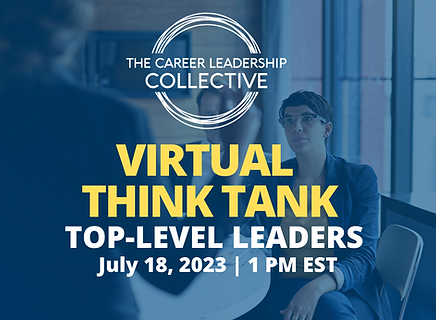
TOPICS INCLUDE:
-
Staff team stability and high performance in times of stress.
-
Helping senior administrators make career services a priority.
-
Where are we headed?
-
DEI Trends
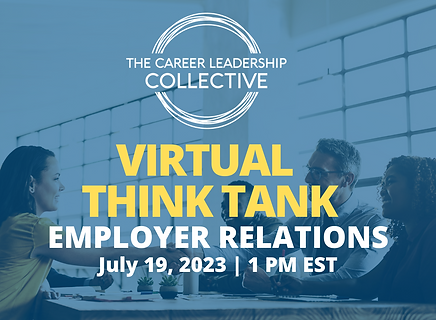
TOPICS INCLUDE:
-
Helping employers in recruiting diverse students.
-
Everything career fairs!
-
Providing meaningful educational content for employers.
-
Employer relations staff goals and focuses.
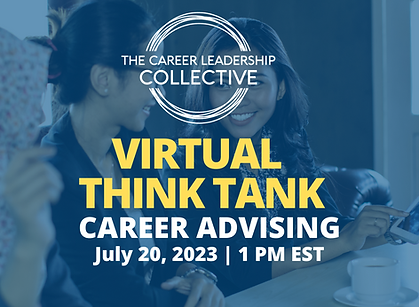
TOPICS INCLUDE:
-
Where are we headed with career advising? What is changing? What is steady?
-
How does Career Services intersect with student anxiety and wellness initiatives?
-
What are actionable ways to impact DE&I?
-
Scalable ideas for creative faculty connections!
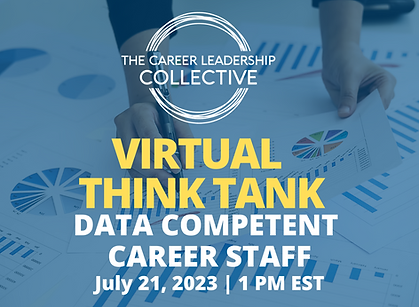
TOPICS INCLUDE:
-
Data competencies
-
Talking the language of data to faculty and administrators
-
Using career data around your campus
-
Implementing Equity and Inclusivity Practices
